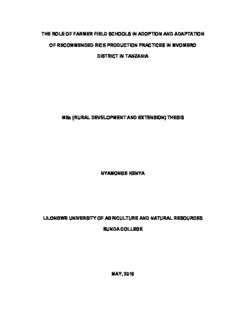
the role of farmer field schools in adoption and adaptation of recommended rice production PDF
Preview the role of farmer field schools in adoption and adaptation of recommended rice production
THE ROLE OF FARMER FIELD SCHOOLS IN ADOPTION AND ADAPTATION OF RECOMMENDED RICE PRODUCTION PRACTICES IN MVOMERO DISTRICT IN TANZANIA MSc (RURAL DEVELOPMENT AND EXTENSION) THESIS NYAMONGE KENYA LILONGWE UNIVERSITY OF AGRICULTURE AND NATURAL RESOURCES BUNDA COLLEGE MAY, 2016 THE ROLE OF FARMER FIELD SCHOOLS IN ADOPTION AND ADAPTATION OF RECOMMENDED RICE PRODUCTION PRACTICES IN MVOMERO DISTRICT IN TANZANIA NYAMONGE KENYA BA. (Rural Development), Tanzania A THESIS SUBMITTED TO THE FACULTY OF DEVELOPMENT STUDIES IN PARTIAL FULFILMENT OF REQUIREMENTS FOR AWARD OF THE DEGREE OF MASTER OF SCIENCE IN RURAL DEVELOPMENT AND EXTENSION LILONGWE UNIVERSITY OF AGRICULTURE AND NATURAL RESOURCES BUNDA COLLEGE MAY, 2016 DECLARATION I Nyamonge Kenya, do hereby declare that this thesis is a result of my own original effort and work, and that to the best of my knowledge, the findings have never been previously presented to Lilongwe University of Agriculture and Natural Resources or elsewhere for the award of any academic qualification. Where assistance was sought, it has been accordingly acknowledged. Nyamonge Kenya Signature: ___________________________ Date: ___________________________ i CERTIFICATE OF APPROVAL We, the undersigned, certify that this thesis is the result of author‟s own work, and that to the best of our knowledge, it has not been submitted for any other academic qualification within Lilongwe University of Agriculture and Natural Resources or elsewhere. The thesis is acceptable in form and content, and that satisfactory knowledge of the field covered by the thesis was demonstrated through an oral examination held on ……………………. Major Supervisor: Associate Prof. Charles Masangano Signature: _____________________________ Date: _____________________________ Supervisor: Associate Prof. Daimon Kambewa Signature: _____________________________ Date: _____________________________ Supervisor: Prof. Malongo R. S. Mlozi Signature: _____________________________ Date: _____________________________ ii DEDICATION This work is dedicated to my lovely parents Kenya Muhenga Marwa and Mariam Muhabe who laid a strong foundation for my education. It is also dedicated to my beloved brother-in- law Daniel Joram and his family for their moral and material support rendered to me throughout my study period. iii ACKNOWLEDGEMENTS This work would not have been accomplished without the tireless help and encouragement of various people. My acknowledgement is extended to the following individuals and institutions: First and foremost, I would like to thank the Almighty Living God for His love, protection and guidance. Secondly, I would like to sincerely thank USAID via iAGRI and RUFORUM for sponsoring my studies 100% and coordinating my studies respectively. I am very grateful to Sokoine University of Agriculture administration in general and Development Studies Institute specifically for granting me a fully paid study leave. In a very special way I would like to thank the supervisory team: Associate Professor C. Masangano, Associate Professor D. Kambewa, and Prof. M. R. S. Mlozi for their professional guidance and criticisms. Besides, I am very thankful to all staff members of the Department of Extension at Bunda College for the support they rendered me throughout my study period. I am very grateful to all staff of Bunda College Library as well as Sokoine National Agricultural Library for material and advisory support they rendered me throughout my study period. Moreover, I would like to thank Mvomero District leadership, ward leadership, village leadership and all farmer field schools members in general and Mrs. Yusta Kidawa specifically for facilitating data collection process. Special thanks should go to my data collection team members for the good work done during data collection. iv My sincere thanks should as well go to my fellow students Mayamiko Kakwera, Patrick Tembo, John Kamanga and Vinjeru Nyirenda for their support during my study period. v ABSTRACT Farmer Field Schools (FFS) provide farmers with an opportunity to experiment new technologies which help them to make informed decisions that eventually lead to increased production and income. This study aimed at assessing the role of FFS in adoption and adaptation of recommended rice production practices in Mvomero district in Tanzania. To achieve the above objective a cross-sectional research design was adopted whereby 188 respondents (FFS members) were selected through a multi-stage sampling technique. Both qualitative and quantitative data were collected using various methods including household survey, interviews, Focus Group Discussions and observation. Data analysis was done using SPPS Version 22. The results of the study show that a total of 15 recommended rice production practices were promoted using FFS in the study area and more than 75% of FFS members were found to be aware of them. The results further show that the majority of the recommended rice production practices (80%) promoted were adopted by more than 65% FFS members. However, the study results show that only 20% of the recommended rice production practices were adapted by FFS members due to financial constraints and risk averse behaviour. It was therefore concluded that FFS promoted a good number of recommended rice production practices and that the level of adoption of the recommended rice production practices was high while the level of adaptation was low. It is recommended that awareness creation among farmers on the recommended rice production practices and other agricultural technologies should be done through FFS. Additionally, the adoption of recommended rice production practices and other vi agricultural related technologies should be promoted through FFS whenever resources allow. vii TABLE OF CONTENTS DECLARATION................................................................................................................ i CERTIFICATE OF APPROVAL ................................................................................... ii DEDICATION.................................................................................................................. iii ACKNOWLEDGEMENTS ............................................................................................ iv ABSTRACT ...................................................................................................................... vi TABLE OF CONTENTS .............................................................................................. viii LIST OF TABLES .......................................................................................................... xii LIST OF FIGURES ....................................................................................................... xiii LIST OF PLATES ......................................................................................................... xiv LIST OF APPENDICES ................................................................................................ xv LIST OF ABBREVIATIONS AND ACRONYMS ..................................................... xvi CHAPTER ONE ............................................................................................................... 1 INTRODUCTION............................................................................................................. 1 1.1 Introduction .......................................................................................................... 1 1.2 Background .......................................................................................................... 1 1.3 Problem Statement ............................................................................................... 3 1.4 Research Justification ........................................................................................... 4 1.5 Research Objectives ............................................................................................. 5 1.6 Research Questions .............................................................................................. 5 1.7 Operational definitions ......................................................................................... 6 1.8 Limitation of the study ......................................................................................... 6 viii
Description: